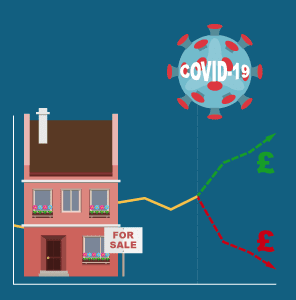How Will Coronavirus Impact House Prices?
 Although most of us have come to terms with the Coronavirus (COVID-19) pandemic, the way in which the last year or so has played out stills seems a little surreal.
Although most of us have come to terms with the Coronavirus (COVID-19) pandemic, the way in which the last year or so has played out stills seems a little surreal.
At the beginning of 2020, it would have been hard to imagine that, in just a few months, the country would come to a complete standstill.
Although there was some respite with a loosening of lockdown rules, as winter kicked in, the ‘second wave’ has left much of the population shrugging and wondering what will happen next.
For the home buying and selling industry, somewhat surprisingly, the doomsayers were proven wrong.
Since early summer, despite all the negative headlines, not to mention the uncertainty surrounding Brexit, a refreshed sense of optimism was restored across the property market.
What economists label a ‘black swan’ event has actually confounded expectations. The Halifax and Nationwide believed that the UK housing market grew by as much as 7%.
Will Coronavirus Cause a Property Market Crash?
Ideas as to how the housing market remained so buoyant range from pent-up demand over lockdown through to unprecedentedly low-interest rates fuelling a healthy buying environment.
Nonetheless, if you’ve currently got your house on the market or are looking to sell, you may be concerned about where things are heading.
Yet, whilst an event like Coronavirus is unprecedented in most of our lifetimes, there are plenty of reasons to remain hopeful and absolutely no need to panic sell.
First off, let’s look at some of the inevitable negative effects…
The Bad News…
With so many businesses effectively shutting down, not to mention the enormous pressures on the NHS and other essential public services, the economic shocks resulting from Coronavirus cannot be underestimated.
As the government injected massive sums of money to keep the economy afloat and jobs in place, the main priority was to get through this turbulent period.
However, at this stage, nobody knows when and how exactly the health crisis will ease.
To date, at least £210 billion has been spent on the furlough scheme.
Although a sizeable amount of people are now able to work from home, many employers will have to make tough decisions in the coming months. Many businesses may also be forced to close.
The result could be a noticeable increase in unemployment – particularly amongst the young. Furthermore, there’s a chance that the economic slowdown could stretch out for longer than we expect.
The Good News…
At the time of writing, most industry specialists agree that the likelihood of a house price crash still remains remote.
There’s a consensus that there may well be a temporary downturn but prices should bounce back especially once the vaccine fully rolls out.
Despite all the panic, most people who have home sales going through are not pulling out.
There’s also growing evidence of regional markets picking up as people see the benefit of living away from town and city centres post coronavirus.
Although traders and investors will take a different view, the general market buys homes for the long term and are not concerned about the short-term effects of the coronavirus.
Therefore, any current forecasts are often baseless.
None of the price indices has validity plus any transactions that do happen during the COVID-19 period will bear little relation to the market as a whole.
In short, nobody knows what will really happen…
Is This Going to Be Like The Last Recession?
Although unpredictable, this is not going to be like the 2007/08 recession.
Without underestimating the seriousness of the situation, the country’s economy and housing market is in a much stronger position compared to the previous downturn.
Back then, the banking system was on the verge of collapsing.
This time it’s a health crisis and things are a lot more sturdy.
This is not to downplay the situation. There are several industries that will suffer badly in the recession including hospitality, restaurants, bars/pubs and high street retail. This will filter through into the whole housing market.
Although mortgage lenders are worried about the current situation, their balance sheets are healthy and they are well-capitalised to weather what could be a turbulent period.
Also, when a successful vaccine is introduced, the chances of a swifter recovery are greater.
Estate Agents and Property Professionals Have Coped Well
The logistics of the house sale market have also proven to be adaptable to challenging circumstances like this.
Even during the height of the pandemic, for example, safety-conscious viewings / appointments were done whilst on lockdown (see below), contracts signed online and we learnt how to communicate online better than ever before.
Some say that this new way of working may well become the norm.
Interest Rates Hit New Lows
You’re probably aware that the Bank of England dropped interest rates to a new historical low of 0.1% in March of this year.
Alongside various other economic measures, this will undoubtedly help fuel house price growth once the Coronavirus crisis is over.
There is also discussion of banks and mortgage lenders lowering affordability tests – making homeownership more accessible to all.
Really Need to Sell Your Home (Despite Coronavirus)?
 First off, please do not panic. If you need to sell, you will.
First off, please do not panic. If you need to sell, you will.
To reiterate, the housing market may well go through the downturn but things will turnaround.
Coronavirus and Your Mortgage
If you’re planning to buy a new property once you sell, there’s a good chance you’ll be able to access a very competitive mortgage rate.
If you already have a mortgage offer in place and are moving forward with the sale, it’s probably better to keep this in place to avoid a number of potential hassles.
However, you may find some hurdles as lenders ability to handle caseloads at the moment is more restricted.
Some of the major lenders including the Halifax, Nationwide, HSBC and Santander have stated they are continually reviewing market conditions and will still keep their high loan to value products in place. In other words, if you have less of a deposit and want to buy another property or remortgage, you should be ok.
Now that more of the industry continues to adapt to the new climate and way of working, things should speed up.
Remember also that if you’re on a tracker mortgage rate, your interest payments will reach a record low.
If your house is still on the market, this hopefully means that you can ‘hold out’ for a while.
Facing Financial Difficulty?
If you’re worried about your job, and therefore your ability to pay your mortgage, speak with your employer directly.
The government has announced a series of measures to protect jobs as well as other assistance and grants to businesses in need.
Be sure to check the latest guidance for employees. If your employer is furloughing, you should get your wages as normal. Or you may be working on a part-time furlough basis.
If you’re waiting for grants to come through or still struggling, you can also claim a mortgage repayment holiday of up to 3 months.
To find out more about this, contact your mortgage lender. They will undertake an assessment of your situation and let you know if you’re eligible.
Remember that this does not mean that you can escape your mortgage obligations. You will have to pay the lender back and the amount of interest you owe will build up.
Therefore, if you can afford to keep up, we’d recommend doing so.
If you have personal loan or credit card debts that you’re struggling with (in addition to your mortgage), it’s worth speaking with your lenders to see how you could spread the repayments out to ease the load.
Selling on the Open Market
If your property is on the market but you’ve noticed the number of viewings drop, don’t be disheartened.
Provided your property is priced realistically, you will sell it!
Yes, you will find things slow down in the coming months, but this doesn’t mean that people are not interested in buying.
With more people at home now, search activity on the main property portals like Rightmove and Zoopla has never been higher.
For this reason, make sure your estate agent has done a good job with the online marketing of your property for sale.
This means good quality photos, detailed floorplans and descriptions.
The better agents will also be rolling out modern tech such as virtual tours.
Remember, even though your estate agency may currently be closed, they should be working remotely. There’s no excuse for them to not be able to offer a decent service.
Should You Accept a Lower Offer for Your Property?
You may find buyers trying to negotiate down the price, attributing a ‘coronavirus-led recession’.
They’ll probably try to capitalise on the scary headlines (from clueless journalists).
Unless you really have to, our general advice is to reject any low-ball offers outright.
We would encourage you to read our content above and understand that this is merely a short-term market shakeup.
Use a Different Estate Agency
If you find your estate agent has simply lost interest or you’re having trouble getting hold of them, you may want to consider swapping.
Our own quick estate agency has seen a steady flow of enquiries for the properties we’re marketing.
Since the COVID-19 outbreak, however, we can not undertake any public-facing activity.
What we are doing is are Facebook Live sessions, Whatsapp video viewings as well as producing 360° tours for our clients.
Of course, this is no substitute for seeing a house ‘in the flesh’. We’re currently able to run socially-distanced viewings and keep things safe.
List with an Auction House
For the foreseeable future, given the social distancing rules, most auction houses are running their events online.
This is likely to continue for the foreseeable future.
Buyers can bid for properties within a set timeframe (often longer than what is normally the case).
A few things to take note of:
- The process of selling a house at auction is not as quick as you may think and can often take 3 or 4 months in total;
- Auction buyers will still want to see the property before they decide if they’re going to bid. These may be difficult for ill-prepared auctioneers to organise in the current environment;
- The fees you’ll pay will almost always be higher compared to using an estate agent. Solicitors will also charge extra as they need to produce specific auction legal packs;
- There may be conflicts over what the ‘reserve’ price should be. If it’s too high, you’re at risk of it not selling and facing abortive costs. As mentioned above, make sure you’re realistic;
- Auction houses are sometimes known to play the same games as estate agents and overprice properties to win instructions. Avoid this trickery by getting to grips with the ebbs and flows of the local property market yourself. Feel free to request one of our free bespoke house valuation reports.
Renting Out Your Property
Throughout the initial peak months of COVID-19, the lettings market also effectively came to a standstill.
With heavy lockdown rules in place, it was impossible for tenants to leave properties (even if they wanted to). The courts were also closed and evictions were stopped.
However, since about mid-May, the market has been returning to a state of normality. As long as you have a property in good condition in a favourable location, you shouldn’t have any issues.
Whether you choose to rent out your property (instead of selling) really comes down to your own objectives.
If you have a residential mortgage, you cannot simply let the property out without what’s called a ‘Consent to Let’.
There may also be tax issues when you come to eventually sell.
We explore this and other practical and financial issues in our post on selling a tenanted property.
Take Out a Bridging Loan
If you’re in the unfortunate position of a being in broken house sale chain, using a bridging loan – essentially a short-term mortgage – could be an option worth exploring.
Whilst the application process is not as strict as taking out a normal home loan, most bridging lenders will be cautious as the Coronavirus situation plays out.
Before making the application, you’ll need to check that you have a sufficient amount of equity in the property and enough money to service the debt.
Broadly speaking, there are two types of bridging loans:
Open Bridging Loan
Open bridging loans are for a prolonged period and have no predefined end date.
Most of these loans last for between 3 and 12 months but the term can be extended.
Closed Bridging Loans
This type of bridging loan has a pre-defined end date and a cheaper interest rate.
A closed bridging loan can be useful if you have exchanged contracts already. The loan repayment date can be arranged in line with the completion date.
How Much Will You Have to Pay?
Brace yourself… Bridging can often be triple what you would pay for a standard mortgage.
The bridging lender will take a second charge security on your property. This is because the mortgage lender has the first charge. If you own the house without a mortgage, they will take the first charge.
Bridging Loan Risks
- With such high interest rates, ask yourself whether a bridging loan is really worth it. Could you borrow money from a cheaper source, for example?
- There will be extra admin/management fees to process the loan (known as ‘entry’, ‘exit’ or ‘arrangement’ fees);
- A lot of bridging lenders will ask you to pay extra legal fees;
- You could risk losing your home if you cannot keep up with the interest payments;
- Unlike the mortgage industry, bridging lenders are unregulated by the Financial Conduct Authority (FCA). If things go wrong, you’re generally not as well protected;
- With surveyors currently on lockdown, it may be difficult to go through the initial stages unless they’re willing to work on an online basis.
How Property Solvers Can Help…
 We hope this post has at least given you some ideas as to how to navigate through this very strange period as a home seller.
We hope this post has at least given you some ideas as to how to navigate through this very strange period as a home seller.
The co-founders here at Property Solvers have been through a few market cycles and pride ourselves in offering impartial advice.
If you’re looking for an honest and up-front chat about selling your house during the COVID-19 crisis, we’re completely available.
You can contact us 24/7 on 0800 044 3733 (freephone), fill out our enquiry form or use our chat service.
For those interested in our services, we can run through our we buy any house (quick cash sale), auction and express home sale options. We never place any obligation.
Quick Cash House Sale (During the Coronavirus Crisis)
If you’re looking for a swift and hassle-free sale, our ‘we buy any house‘ option may work well for you.
As it’s a private sale, you won’t have to worry about estate agency costs and we’ll also cover your legal fees.
During the Coronavirus crisis, we would need to undertake one socially-distanced viewing and an independent survey. You do not need to be present.
Everything can then be undertaken remotely and we’ll complete the sale within a month.
Property Auction Services
The principal trade-offs our quick house sale clients make is that the purchase prices lie in the region of 75% of the market value.
If we see that this option is unfeasible, we’ll discuss our property auction service.
Although the time period is slightly lengthened, it’s a great way to achieve between 90% and 100% of the market value without the hassles that come with selling through an estate agency.
Estate Agency Sale (During the Coronavirus Crisis)
If you have more time to sell and getting the
Property Solvers Valuation Process
We use ‘realistic pricing model’ which uses current data sourced from the Land Registry to get a broader idea of what properties are selling for in your area.
We will apply specific details on your properties comparative size, condition and any other unique characteristics.
For example, if your property has a larger garden or an extension then it’s fair to command a higher price.
Secure a House Sale in 28 Days
Using virtual tours and live videos, we’re confident of our ability to secure you a buyer in under than 28 days.


We’ll take high-quality photos (and won’t publish unless you are 100% happy), produce a floor plan and mount a high impact ‘for sale’ sign.
There will be no fees until you complete plus no tie-in contracts. There really is nothing to lose by giving us a try.
As well as Rightmove, Zoopla and Prime Location, we’ll also market your property on a range of other portals to get your property maximum exposure.
What’s more, our estate agency service also includes a 24/7 enquiry line and chat service. We’ll never miss a beat…



